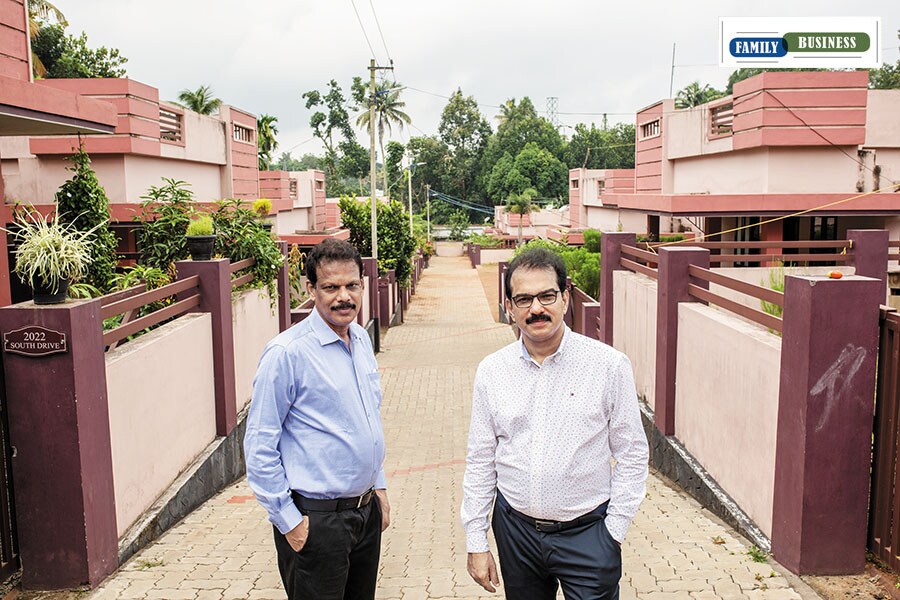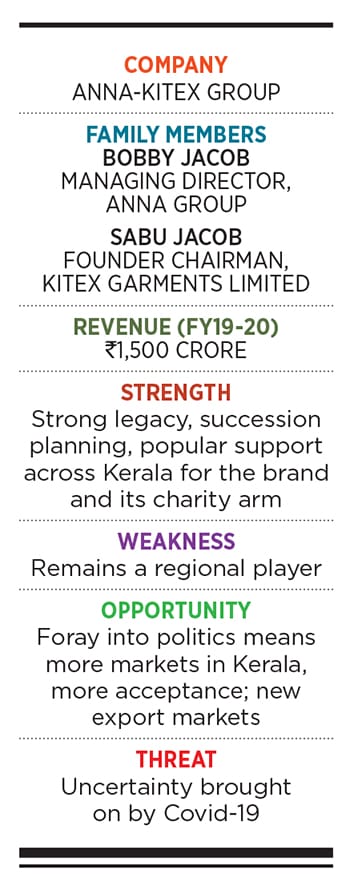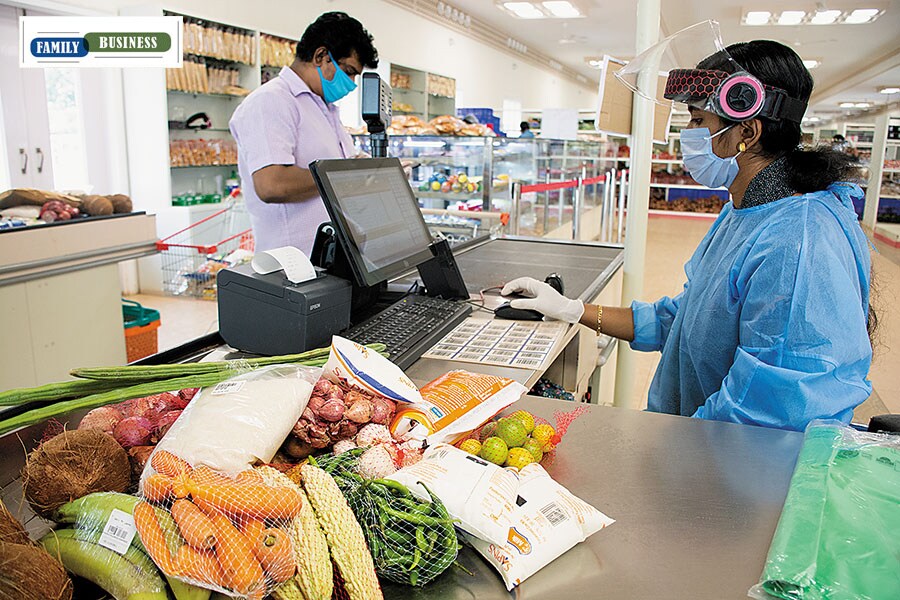
Sabu and Bobby Jacob: Cut from a different cloth
Second-generation brothers Sabu and Bobby Jacob run separate successful businesses and are jointly working towards creating model villages in Kerala
 Sabu Jacob (right) with brother Bobby Jacob
Sabu Jacob (right) with brother Bobby JacobImage: Arjun Suresh for Forbes India
Sabu Jacob certainly has a few anxious months ahead of him.
But it’s not because there is a global pandemic wreaking havoc across businesses small and big and jeopardising economies worldwide. He runs what he describes as a recession-immune business, that of kids apparel. His company, Kitex Garments, a Kerala-based exporter of kids wear, is the world’s second-largest manufacturer of apparel and sells to some of the world’s biggest retailers including Amazon, Walmart, Gerber, Mothercare, Carters, The Children’s Place and Target, among others.
“It’s unlikely that a kid in the US hasn’t worn clothes made at our factory in Kerala,” says the 54-year-old who runs his factory from Kizhakkambalam, a non-descript village near Kochi in Kerala. “With one centralised manufacturing facility, we export a million units of kids wear a day to over 28,000 stores in the US. Our nearest competitor is a Chinese company that has over 15 manufacturing facilities.” Today, almost 99 percent of the company’s products are sold to the US market, with just 1 percent going to European markets.
“I had learned this early on when the 2001 recession hit,” Sabu says. “The last area where parents will look to cut down on costs is their child’s clothes.”
Kitex Garments is part of the larger Anna-Kitex Group, run by Sabu and his older brother Bobby. While Sabu runs the export-oriented infant wear business, Bobby’s diversified business includes manufacturing aluminium ingots, kitchen utensils, spices, and school bags. The group has an annual turnover of ₹1,500 crore, of which Kitex garments rakes in ₹1,050 crore, while Bobby’s business has a turnover of ₹500 crore.

Yet, Sabu has been having some sleepless nights of late. That’s because, as Kerala gears up for the local civic polls in October, a bellwether for the Assembly elections in 2021, a political party firmly backed by the 54-year-old and his brother will contest in five panchayats, with 74 candidates. Their opponents cut across established political parties who are likely to put up a united fight.
Politics isn’t unfamiliar territory for the brothers. In 2015, 17 of the 19 candidates backed by them won against a unified opposition in the panchayat elections. That was perhaps the first time in India’s electoral history that a company openly backed candidates. Since then, the Anna-Kitex Group has won acclaim for helping build houses, roads, canals, promoting organic farming, and a supermarket where products are sold at 80 percent discount for the 36,000 residents of their village.
“We have shown that when you don’t look to make profits and abuse power, you can make a change,” Sabu says. “As we have expanded, we have formed a political party, Twenty20, that will contest the elections.” In 2013, the group had formed a charity arm, Twenty20 Kizhakkambalam, as an NGO registered under the Travancore Cochin Literary Scientific and Charitable Societies Registration Act, 1955. The Jacobs had used their personal funds, and money from their companies’ Corporate Social Responsibility funds to help in the functioning of the NGO.
In 2015, Twenty20 Kizhakkambalam backed independent candidates in the panchayat elections. “We have been brought up with a firm belief that when the business grows, the community and locality should grow with us,” Sabu says. “That’s the reason we decided to foray into politics. We have now shown what a corporate panchayat can do.”
Today, the Anna-Kitex Group has emerged as one of Kerala’s formidable business houses and also boasts a succession plan that could put many of India’s biggest family businesses to shame.
From aluminium scrap to school bags
Much of the group’s success began in the late 1970s, when MC Jacob, a public works contractor who had dabbled in numerous businesses including soap and trading in areca nuts, forayed into manufacturing aluminium and related products.
“In the 1960s when nobody had forayed into soaps, my father had tried his luck with it,” says Sabu. “It was a failure then. But had he continued with it, perhaps it would have found more success than Nirma today.” That failure forced Jacob to look at aluminium products and utensils, which were finding takers in Kerala. Back then, companies based in Tamil Nadu and Karnataka made aluminium utensils with scrap from the INDAL plant in Kerala and sold the finished goods there.
 Organic farms along the Ambunadu-Kadampra canal in Kizhakkambalam village
Organic farms along the Ambunadu-Kadampra canal in Kizhakkambalam village“This aluminium had a high level of lead, which is poisonous,” adds Sabu. “But they were selling it rather cheap, and my father couldn’t compete with that. But he knew he couldn’t cheat customers.”
In 1968, after mortgaging some properties, Jacob started producing aluminium, using scrap from homes and the INDAL factory. Over the next four years, Jacob, who started with 10 employees, built up a huge stock of aluminium, so that when Tamil Nadu and Karnataka were hit hard by power outages, leading to an aluminium shortage in Kerala, he had enough inventory. “Until then, a kilogram of aluminium was being sold at ₹6 per kg, which shot to ₹24,” says Sabu.
Over the next few years, the group began focussing on aluminium utensils and found a steady market in Kerala. The company was named after Annam, MC Jacob’s mother, while its cookware range Chaksons was named after his father, Chacko.
By the late 1970s the group forayed into textiles and spices, with Kizhakkambalam Textiles (shortened to Kitex later) and Saras curry powders. Kitex focussed on making bedsheets and lungis. “The idea was to give permanent employment to people,” Sabu says. “My father had grown up seeing unemployment, and he wanted to ensure he provided jobs.”
 The supermarket set up by Twenty20 Kizhakkambalam provides groceries and other essentials at discounted prices
The supermarket set up by Twenty20 Kizhakkambalam provides groceries and other essentials at discounted pricesGoing Global
In 1995, Sabu decided to set up Kitex Garments, focussed on infant wear. “We were the first company to set up a dormitory with 2,000 beds in India and we made it centrally air-conditioned,” he says. “Our father had ensured that we worked our way up from the bottom when it came to the business. I have cleaned toilets, worked at the factory level across functions before being brought to the top. So, the welfare of our workers has always been paramount.”
Jacob, who passed away in 2011, split his family business between his sons. Bobby handles Anna Aluminium, Saras, and Kitex Ltd, which makes shirts, trousers and school bags, among other things, while Sabu runs Kitex Garments. “There are a few things our father always told us,” Sabu says. “That we shouldn’t go into the liquor or finance business. He also told us not to employ relatives or close friends, and not to get into a partnership with anybody. He ensured that the business was divided between us.”
Today, the brothers stay under the same roof with their mother, wives and children. “We eat together and sleep under the same roof,” Sabu says. “And we don’t talk about each other’s business unless we need specific advice. Our father had always said that if the business wasn’t divided, then it could make us enemies.” Now, Sabu has set a growth target of ₹2,000 crore in revenue by 2025, while Bobby is looking to target the European market for infant wear apart from ramping up his spices and aluminium business.
“Kids wear is a relatively more stable segment, and India is reasonably competitive internationally,” says Devangshu Dutta, CEO of consulting firm Third Eyesight. “However, a subdued market affecting the financial health of a specific customer account remains a risk for any business.”
Improving Local
The group’s foray into local politics, Sabu claims, happened due to their father’s desire to improve the lives of villagers in Kizhakkambalam, where the family is based.
“We had started with medical treatment and set up a camp where some 5,000 people had come,” says Sabu. “Around that time we realised that in a village of over 36,000 people, some 220 did not have electricity, 280 didn’t have toilets, and nearly 1,000 didn’t have a proper roof, and were using tarpaulin sheets.”
The Jacobs then called an all-party meeting to discuss the situation. “Initially everybody agreed to work together,” Sabu says. “But as time went by, many began skipping these meetings.” Fed up with the lack of concern from the authorities, the group launched Twenty20 Kizhakkambalam in 2013 to make Kizhakkambalam a model village by 2020. The NGO began by ensuring water supply by digging borewells, which was later blocked by the panchayat, which was ruled by a coalition led by the Congress. “Around 2,000 people marched to their office to remove the stay,” Sabu says.
An initiative to provide household items at discounted rates during Onam also ran into trouble after people thronged the 40,000 sq ft facility, forcing authorities to shut it down. “It was becoming difficult, and we realised that unless the village authorities didn’t change, no good was likely to happen,” Sabu says. But the group had found huge admiration from the villagers and decided to support independent candidates for the local election.
Of the 19 candidates they supported, 17 won gram panchayat seats and two of the three block panchayat seats. The candidates were selected through an elaborate screening process that begins with four households selecting a high power committee member. From about five high power committee members, one area secretary is selected, after which 20 area secretaries select a ward committee comprising a president, two vice presidents (male and female), two secretaries (male and female), and two patrons. The committee then makes a recommendation for a candidate and the names are proposed to a board comprising 12 members including Sabu, which puts forth the suggestion and gives adequate time for the public to approve.
Since the election, Twenty20 Kizhakkambalam has built some 600 houses, with the companies’ CSR funds. “The panchayat gives only ₹2 lakh per house. It costs ₹14 lakh to make these houses,” says Sabu. Besides, the NGO has also set up a supermarket where vegetables, groceries, food items, and other essentials are sold at a 50 percent discount. During festive seasons when the prices of vegetables, fruits, and other groceries skyrocket, the supermarket also gives a discount ranging from 50 to 70 percent. Currently, about 30 percent of the funding for the NGO comes from the CSR funds of the group, while the rest is from the personal savings of the brothers.
“The political party and the NGO are separate,” says Sabu. “A lot of the work we do at the panchayat level is from the CSR funds and our money. Across the world, governments alone cannot do all the work. Private-public partnership is the way to go, and that’s what we are doing.”
Then, there are other initiatives such as organic farming, road construction, ground water conservation and building check dams on canals in a region where rain is aplenty and floods have become the norm. “We began by clearing up the canals and building dams. Now, during the monsoon season when there might be floods, we never face any trouble,” says Sabu.
Now, as Kerala looks at state elections in 2021, will Sabu’s newly launched political outfit look to contest that too? “We have no such ambitions,” Sabu says. “The whole idea is to make the village a model panchayat for the country. Politicians are only looking to loot the country. We are trying to bring about change in our villages.”
Only time can tell if their model will work.
(This story appears in the 30 November, -0001 issue of Forbes India. To visit our Archives, click here.)








